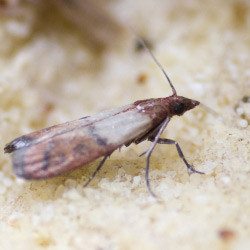 The Indianmeal moth is considered to be the most common pest inhabiting kitchens, food processing plants, restaurants, warehouses and any other location where food products are stored. These moths are often referred to as pantry pests as they feed on all types of grain, cereals, cornmeal, powdered milk, flour, dried fruits, chocolate, nuts and dry pet food.
The Indianmeal moth is considered to be the most common pest inhabiting kitchens, food processing plants, restaurants, warehouses and any other location where food products are stored. These moths are often referred to as pantry pests as they feed on all types of grain, cereals, cornmeal, powdered milk, flour, dried fruits, chocolate, nuts and dry pet food.
Identifying the Indianmeal moth is not a difficult task. They are uniquely colored; their wings are pale gray with outer two-thirds colored reddish brown with a coppery luster. The moth is about 5/8 to ¾ of an inch.
Management and Control
The Indianmeal moth has rapidly become a serious problem, creating an incredible economic loss within the dried food processing industry. The larva feeds on most stored dry foods, causing contamination and loss of product. The most common control method is insecticides; however, the Indianmeal moth has developed a drastically reduced susceptibility to the chemicals used in pesticides, creating an even greater risk to the food industries.
The resistance to insecticides along with new restrictions being imposed on the use of insecticides leads to an even greater need for businesses to develop prevention tips and daily maintenance control methods. One interesting fact to note is that the ideal temperature in which Indianmeal moths thrive is 90 degrees. This creates a perfect environment for infestations. To prevent this infestation, keep the facility cooled down to no more than 60 degrees.
Another method of prevention is to maintain strict sanitation policies throughout the facility:
- Keep countertops, workstations and floors clean at all times.
- Trash containers should be covered with a tight lid when not in use.
- Empty trash daily and keep containers washed.
- Routinely vacuum thoroughly and clean with soap and water the entire facility where stored foods are kept or handled.
Also, inspect food storage bins regularly, looking for any web-type substance on the surface of the food product. Remember, the female Indianmeal moth can deposit anywhere between 100 and 400 eggs at one time on food surfaces. In a warm environment, these eggs can hatch in as little as 48 hours and burrow into food to feed immediately. Your pest control specialist should be contacted immediately when the first sign of a presence of Indianmeal moths.
